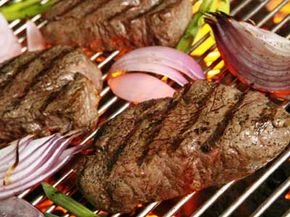Beef: It's what's for dinner, according to advertisements. But not all beef is quite the same. When you look through your grocery store's meat counter or talk to your local butcher, you learn there are all kinds.
Angus Beef, also known as Black Angus or Certified Angus Beef, is a specific brand of beef. Maybe you've seen Angus cattle out in the fields (if you live near farmland). Or maybe you've seen it advertised on restaurant menus and grocery store windows. The question is: What's different about this type of meat? What makes beef enthusiasts herald Black Angus beef as high quality, if not the highest?
Advertisement
The Black Angus club is very selective in many ways. Not only do the cattle have to pass several tests to qualify as Black Angus cattle while they're alive, but once they're reduced to market food, the meat must qualify as high quality meat as well. Black Angus cattle make great cattle for the farm because they adapt easily. Many characteristics of these cattle make them different from other breeds. As you continue to read the following pages, you'll learn a little more about the life of Black Angus cattle.
Black Angus meat must pass rigorous tests to mark it for quality. Only the highest quality Angus meat is given the designation "Certified Angus Beef," and just because some meat is called "Black Angus" doesn't mean it's the same quality as the certified brand. The best Certified Angus cattle are raised naturally and fed a grass diet [source: Natures Pasture].
So you've got the backbone. Let's get down to the real meat of the issue on the next page.
Advertisement
